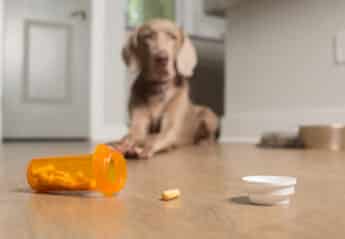Pet Owners
Specialties & Services
With more than 20 specialties and services under one roof, the Schwarzman Animal Medical Center is able to provide high quality collaborative care.

Find A Doctor
The Schwarzman Animal Medical Center is dedicated to providing the highest quality medical care. Search our world-renowned staff by name, department, or condition.
Search Now
About Your Visit
Get ready for your visit to AMC with important information on parking, renovations, and hospital policies.
Learn More
Financial Assistance
Compassionate care is at the core of AMC’s mission, and we offer a variety of financial assistance programs based on need and eligibility.
Learn More
Our Blog
Written by staff oncologist and internist, Dr. Ann Hohenhaus, AMC’s weekly blog is an engaging and educational resource for pet owners looking for pet health tips and information.
Learn More
Ask the Vet Podcast
In partnership with Sirius XM, the Schwarzman Animal Medical Center presents ‘Ask the Vet,’ a podcast all about the pets we love and how to care for them. Dr. Ann Hohenhaus answers questions for pet parents, chats with leading animal experts, and talks about the most concerning issues for our furry friends.
Learn More
Pet Stories
Pet stories showcases the remarkable spirit and courage of AMC’s patients and those who care for them.
Learn More
Social Work Services
AMC is committed to supporting the human-animal bond. Veterinary social work services can help you and your family cope with the challenges of caring for your sick or injured animal companion.

Pet Loss Support Program
Learn MorePet Loss Support Resources
Learn MoreAbout Social Work at AMC
Learn MorePet Caregiver Support Group
Learn MoreAbout the Usdan Institute for Animal Health Education

The Usdan Institute for Animal Health Education at AMC is the leading provider of pet health information.
Learn MorePet Health Library

Your A-to-Z guide to common conditions, clinical signs, and wellness tips.
Learn MoreEvents

The Usdan Institute hosts free, monthly events for pet owners and the public. Attend an upcoming event or stream previous events.
Learn MoreVeterinary Community
Specialties & Services
With more than 20 specialties and services under one roof, the Schwarzman Animal Medical Center is able to provide high quality collaborative care.

Referral Form & Procedures

Access all of the information you need to refer your patients to the Schwarzman Animal Medical Center.
Learn MoreReferral Coordinators

AMC’s Referral Coordinators work with referring veterinarians to ensure coordinated patient care and communication before, during, and after all consultation appointments and procedures.
Learn MoreSend & Receive Medical Records

To ensure optimal patient care, AMC makes it easy to share medical records with our specialty services.
Learn MorePostgraduate Education

The Anna-Maria and Stephen Kellen Institute for Postgraduate Education features comprehensive curricula including our Externship Program, Internship Program, and Residency Program.
Learn MoreContinuing Education

As part of our ongoing commitment to education, the Schwarzman Animal Medical Center hosts regular lectures and conferences led by the top minds in veterinary medicine.
Learn MorerDVM Newsletter

Sign up for our rDVM newsletters to stay up to date with the latest news and clinical guidance from AMC’s staff.
Learn MoreResearch
The advancement of veterinary knowledge is central to the Schwarzman Animal Medical Center’s mission, and our staff regularly undertakes pioneering research to make sure we’re able to provide the best possible outcomes for our patients.

About Research at AMC

Through our Caspary Research Institute, AMC veterinarians work to understand the origins of diseases, to develop preventive measures, and ultimately to achieve cures.
Learn MoreClinical Trials

For more than 50 years, AMC has conducted clinical trials to contribute new scientific knowledge and improve the medical and surgical care for animals.
Learn MoreBeing a Veterinary Technician at AMC
Being a Veterinary Technician at the Schwarzman Animal Medical Center is a highly rewarding career in a role that’s critical to the lifesaving care we deliver every day. Our Veterinary Technicians are trusted team members with a high degree of leadership and decision authority, and our culture of learning supports our LVTs with opportunities for mentorship, advancement, and growth.
Learn More
The Ann and Charles Johnson One Health Institute
The Ann and Charles Johnson One Health Institute supports the One Health approach to medicine, recognizing the growing connection between the health of animals, people, and the environment.
Learn More
Alumni Relations
Since 1964, thousands of veterinarians have graduated from AMC’s postgraduate education programs. We’re immensely proud of the wide ranging achievements and contributions of our alumni.
Alumni Relations
2024 Pet Holidays and Veterinary Awareness Days
Public education is one of AMC’s founding principles and an enduring mission. Use this calendar to spread awareness of common pet health topics among your veterinary clients, colleagues, family, and friends.
Learn More
2025 Pet Holidays and Veterinary Awareness Days
Public education is one of AMC’s founding principles and an enduring mission. Use this calendar to spread awareness of common pet health topics among your veterinary clients, colleagues, family, and friends.
Learn More
Supporters
Our Impact
We’re able to do amazing things with the support of our donors. Take a look at the impact you make with your donation to the Schwarzman Animal Medical Center.
Learn More
Community Funds
AMC’s Community Funds assist animals whose owners are unable to afford either basic or lifesaving specialty care, as well as rescue animals, guide dogs, and retired police and military dogs.
Learn More
Get Involved
Your support of the Schwarzman Animal Medical Center promotes the health and well-being of our animal companions through comprehensive treatment, research, and education.

Donate Today
Learn MorePlanned Giving
Learn MoreDonor Recognition Societies
Learn MoreMore Ways to Support AMC
Learn MoreDonor Honor Wall
The Schwarzman Animal Medical Center extends its deepest gratitude to our committed and loyal supporters who enable us to provide compassionate care and train the veterinary leaders of tomorrow.
Learn More
Attend an Event
The Schwarzman Animal Medical Center hosts regular events in the New York City area. Join us to connect with other pet owners, our veterinary community, and learn more about your pet’s health and well-being
Learn More
Donate Today
As a non-profit institution, AMC’s success is dependent in large part on the generous contributions of donors like you.
Donate
A Gift of Love
By adding 16,000 square feet of new construction to the hospital and renovating nearly 67,000 square feet of existing clinical and client space—a total of 83,000 square feet—the Gift of Love campaign will transform the Schwarzman Animal Medical Center.
Learn More
New York, NY 10065 Contact Us
Pet Owners
CloseSpecialties & Services
Find A Doctor
Find A Doctor
The Schwarzman Animal Medical Center is dedicated to providing the highest quality medical care. Search our world-renowned staff by name, department, or condition.
Search Now
About Your Visit
About Your Visit
Get ready for your visit to AMC with important information on parking, renovations, and hospital policies.
Learn More
Financial Assistance
Financial Assistance
Compassionate care is at the core of AMC’s mission, and we offer a variety of financial assistance programs based on need and eligibility.
Learn More
Our Blog
Our Blog
Written by staff oncologist and internist, Dr. Ann Hohenhaus, AMC’s weekly blog is an engaging and educational resource for pet owners looking for pet health tips and information.
Learn More
Ask the Vet Podcast
Ask the Vet Podcast
In partnership with Sirius XM, the Schwarzman Animal Medical Center presents ‘Ask the Vet,’ a podcast all about the pets we love and how to care for them. Dr. Ann Hohenhaus answers questions for pet parents, chats with leading animal experts, and talks about the most concerning issues for our furry friends.
Learn More
Pet Stories
Pet Stories
Pet stories showcases the remarkable spirit and courage of AMC’s patients and those who care for them.
Learn More
Social Work Services
Pet Health Resources
Veterinary Community
CloseSpecialties & Services
Referrals
Education
Research
Being an LVT at AMC
Being a Veterinary Technician at AMC
Being a Veterinary Technician at the Schwarzman Animal Medical Center is a highly rewarding career in a role that’s critical to the lifesaving care we deliver every day. Our Veterinary Technicians are trusted team members with a high degree of leadership and decision authority, and our culture of learning supports our LVTs with opportunities for mentorship, advancement, and growth.
Learn More
One Health
The Ann and Charles Johnson One Health Institute
The Ann and Charles Johnson One Health Institute supports the One Health approach to medicine, recognizing the growing connection between the health of animals, people, and the environment.
Learn More
Alumni Relations
Alumni Relations
Since 1964, thousands of veterinarians have graduated from AMC’s postgraduate education programs. We’re immensely proud of the wide ranging achievements and contributions of our alumni.
Alumni Relations
Pet Health Holidays 2024
2024 Pet Holidays and Veterinary Awareness Days
Public education is one of AMC’s founding principles and an enduring mission. Use this calendar to spread awareness of common pet health topics among your veterinary clients, colleagues, family, and friends.
Learn More
Pet Health Holidays 2025
2025 Pet Holidays and Veterinary Awareness Days
Public education is one of AMC’s founding principles and an enduring mission. Use this calendar to spread awareness of common pet health topics among your veterinary clients, colleagues, family, and friends.
Learn More
Supporters
CloseOur Impact
Our Impact
We’re able to do amazing things with the support of our donors. Take a look at the impact you make with your donation to the Schwarzman Animal Medical Center.
Learn More
Community Funds
Community Funds
AMC’s Community Funds assist animals whose owners are unable to afford either basic or lifesaving specialty care, as well as rescue animals, guide dogs, and retired police and military dogs.
Learn More
Get Involved
Donor Honor Wall
Donor Honor Wall
The Schwarzman Animal Medical Center extends its deepest gratitude to our committed and loyal supporters who enable us to provide compassionate care and train the veterinary leaders of tomorrow.
Learn More
Attend an Event
Attend an Event
The Schwarzman Animal Medical Center hosts regular events in the New York City area. Join us to connect with other pet owners, our veterinary community, and learn more about your pet’s health and well-being
Learn More
Donate Today
Donate Today
As a non-profit institution, AMC’s success is dependent in large part on the generous contributions of donors like you.
Donate
Capital Campaign
A Gift of Love
By adding 16,000 square feet of new construction to the hospital and renovating nearly 67,000 square feet of existing clinical and client space—a total of 83,000 square feet—the Gift of Love campaign will transform the Schwarzman Animal Medical Center.
Learn More



